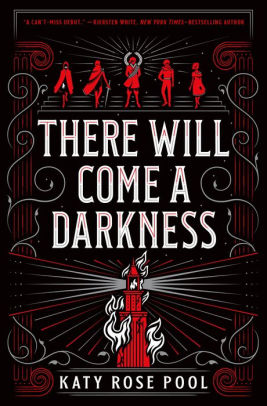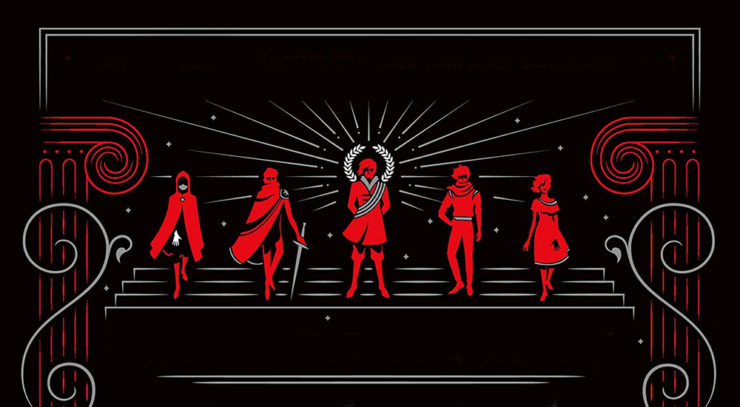The Chosen One is a trope that predates the genre of fantasy and even literature itself. It certainly pops up in just about every religious scripture, Arthurian legend, most mythologies, and seems to permeate our modern day media, from fantasy books to anime, video games, and popular TV shows. You could even say that this trope occurs in the real world, when we hold up some politician or leader as the one that’s going to solve all our problems and save the world. Chosen Ones can be chosen by another person or entity, their lineage, a prophecy, some particular trait they possess (i.e. being “pure of heart”), or some action that they themselves take.
It’s become such a staple of the fantasy genre in particular that nearly all fantasy stories incorporate or invoke the trope in some manner. It can also be pretty lazy storytelling. It can override the hero’s agency. The plot of a Chosen One story tends to bend to this trope, along with just about every other character in the story. So what if this random person doesn’t seem like the best choice to defeat the forces of darkness? He’s the chosen one! The hero’s connection to the main conflict in the story is manufactured. It’s not personal, it’s just dictated by the nature of the trope. It’s an excuse to involve an everyman type of character in a huge, world-spanning conflict that they otherwise would have no connection to. But that is also part of the trope’s strength—that it makes a hero out of a character the audience can fully relate to, be it a high school cheerleader in Buffy the Vampire Slayer or a young son of a slave in The Phantom Menace.
Honestly, I love a good Chosen One trope. I mean sure, it’s potentially elitist, and it can certainly be done badly, but it works as a narrative device because it immediately gives the protagonist a huge burden to bear, that they can either fail or succeed at. We immediately grasp the stakes the story, and what the character stands to lose. It’s not an inherently bad trope—some of my favorite series certainly utilize it, such as Sailor Moon, the Harry Potter series, and Avatar: the Last Airbender.
What these, and most successful uses of this trope, have in common is that there is some inherent struggle within the “chosen” character about their role. For Harry, the question of why he’s the Chosen One hangs over the series until the end of the fifth book when it’s revealed that, in fact, Harry was not the only boy who could have been chosen, and that the only reason Harry is the one who can beat the Dark Lord is because the Dark Lord himself chose him. Both Harry and his schoolmate Neville fit the terms of the prophecy, but it is in Harry that Voldemort sees a threat—because Harry is a half-blood like him. Voldemort chooses Harry and kills his parents, thus both creating the protection that Harry later uses against him (his mother’s love which drove her to shield Harry from Voldemort’s attack) and giving Harry the motivation to fight Voldemort, prophecy or no prophecy.
In Avatar: the Last Airbender, Aang is so distraught at the fact that he’s the Avatar, he winds up burying himself in ice for one hundred years and prolonging a devastating war rather than stopping it. It is only later, once Aang has been awoken and witnesses the Fire Nation’s devastation of the Northern Water tribe, that Aang decides to fulfill his destiny as the Avatar. And along the way he is continually shown to be in conflict between his role as avatar, and his identity as a twelve year old boy. In particular, Aang struggles with a conflict between the philosophy of his people, the Air Nomads, which are peace-loving and violence averse, and the reality of what it will take to defeat the Fire Lord. These conflicts continually push him to choose between the things that are important to him as a person, and the things that are expected of him as the Avatar.
Usagi, the titular character and alter ego of Sailor Moon, is another example of a chosen one—although despite her chosen status, she’s just honestly not a very good leader! Whiny, not very smart, and pretty selfish, she’s thrust into a role she is nowhere near capable of handling and the series constantly reminds us of that. In the very first episode, after being told of her destiny and true identity as Sailor Moon, Usagi faces off against an evil creature of the Negaverse and breaks down into tears, only managing to finish the fight when Tuxedo Mask appears. Throughout the series, people frequently express their disbelief that Usagi—known to be lazy, obsessed with boys and food, and often selfish—is the legendary Sailor Moon, including her own daughter from the future, Chibi Usa. While Usagi is able to demonstrate her strength and determination when it truly counts, she never truly stops being a deeply flawed hero.
Because it’s such a ubiquitous trope, there are also a lot of ways in which writers can subvert and play with your expectations. For instance, while almost all of the Star Wars trilogies center around some kind of Chosen One, the prequel series (while certainly not the most beloved) twists that idea with Anakin Skywalker, prophesied to bring balance to the force…and ends up turning evil and killing most of the remaining Jedi. This sets him up as a primary villain in the original series, and though he is eventually (to some extent) redeemed and does end up technically fulfilling the prophecy, it is only after his evilness has caused irreparable harm to the Jedi Order and the galaxy.
Buy the Book


There Will Come a Darkness
Then there’s the trope of the mistaken Chosen One—illustrated beautifully in Jessica Cluess’s A Shadow Bright and Burning series, where the protagonist, Henrietta, is believed to be a prophecized sorcerer who can defeat the Ancients—except it turns out she isn’t, at all. Through learning more about her lineage, Henrietta finds out she is actually descended from a line of magicians (which in this world are distinct from, and much less respected than, sorcerers) and is not the chosen sorcerer at all. In the first book of the series at least, it seems as though the Chosen One is a girl who was taken over by the Ancients and turned into a servant for them, and thus there is no one left to defeat them. Henrietta eventually decides she doesn’t need to be a Chosen One in order to fight, and thus she and her friends resolve to fight the Ancients themselves. I love the way that this series continually twists our expectations about not only who the Chosen One is, but what it even means to be Chosen.
Another common twist on the Chosen One trope is when the prophecy (or whatever identifies the character as a Chosen One) turns out to be a lie and there really is no chosen one, as in the Matrix sequels. In the first Matrix film, we are told that Neo is The One (to the point where even his name is just the letters for One rearranged). He is, we are told, an anomaly within the Matrix that has the ability to destroy it for good. But later, in the convoluted sequels, Neo finds out that this prophecy, and thus The One, was actually fabricated in order to ensure the continuation of the Matrix. Ultimately Neo does wind up more-or-less fulfilling the terms of this possibly fake prophecy, ultimately sacrificing himself to destroy the Matrix.
There are many ways that writers have taken the trappings of a Chosen One story and twisted it around to surprise the reader. At this point, deconstructions, subversions, and twisted versions of this trope are almost as common as the trope itself. But whether the trope is subverted or played straight, what these successful Chosen One stories have in common is that these characters are interesting even without their status as the Chosen One. Aang isn’t interesting because he’s the avatar—he’s interesting because he’s seemingly a carefree kid who nonetheless must deal with the horrors of war and figure out how he can remain true to his beliefs and still fight. Harry Potter is interesting not because he’s destined to defeat the Dark Lord, but because he’s a neglected kid discovering the wonders of the magical world and finding a place for himself in it. Henrietta is interesting not because she’s a would-be Chosen One, but because she’s smart and scrappy and is willing to do what must be done, prophecy or not. We are drawn to these characters because they are human, and no matter how big their destinies are or aren’t, we want to see them succeed because we like them. They retain their agency and want things beyond simply saving the world, and we want to see them get those things.
It’s safe to say the Chosen One trope isn’t going anywhere anytime soon. Whether they’re pointing out the flaws of this trope or enthusiastically employing it, fantasy writers seem to be drawn to the questions that the Chosen One trope grapples with. Fate versus free-will. Whether or not we can ever rise above our circumstances. What it means to find our own individual purpose. How the weight of responsibility can destroy a person. How we can choose to fight even if no one told us we must. How we can choose not to. Chosen One stories are just one way to explore these ideas, but it’s one that, for good or for ill, fantasy writers can’t seem to let go of.
Katy Rose Pool was born and raised in Los Angeles, California. After graduating from UC Berkeley with a degree in history, Katy spent a few years building websites by day and dreaming up prophecies by night. Currently, she resides in the San Francisco Bay Area, where she can be found eating breakfast sandwiches, rooting for the Golden State Warriors, and reading books that set her on fire. There Will Come a Darkness is her first novel.










